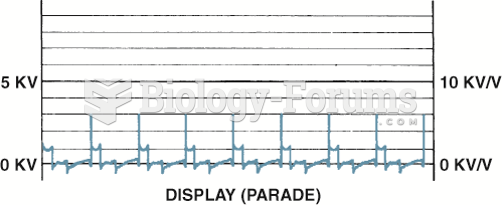|
|
|
The cure for trichomoniasis is easy as long as the patient does not drink alcoholic beverages for 24 hours. Just a single dose of medication is needed to rid the body of the disease. However, without proper precautions, an individual may contract the disease repeatedly. In fact, most people develop trichomoniasis again within three months of their last treatment.
No drugs are available to relieve parathyroid disease. Parathyroid disease is caused by a parathyroid tumor, and it needs to be removed by surgery.
An identified risk factor for osteoporosis is the intake of excessive amounts of vitamin A. Dietary intake of approximately double the recommended daily amount of vitamin A, by women, has been shown to reduce bone mineral density and increase the chances for hip fractures compared with women who consumed the recommended daily amount (or less) of vitamin A.
The longest a person has survived after a heart transplant is 24 years.
There are 20 feet of blood vessels in each square inch of human skin.
 Most air filter housings are located on the side of the engine compartment and use flexible rubber ...
Most air filter housings are located on the side of the engine compartment and use flexible rubber ...
 This spark plug boot on an overhead camshaft engine has been arcing to the valve cover causing a ...
This spark plug boot on an overhead camshaft engine has been arcing to the valve cover causing a ...





